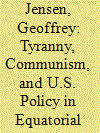| Srl | Item |
| 1 |
ID:
172445


|
|
|
|
|
| Summary/Abstract |
This article examines the Spanish army during the decolonization of Morocco, and it explores the connection between Spanish cultural perceptions – seen most clearly in the myth of Spanish-Moroccan brotherhood – and strategic and operational failures. It pays particular attention to the views of Spain’s last High Commissioner in Morocco, Lieutenant General Rafael García-Valiño, and the Franco dictatorship’s ideologue of Spanish imperialism in North Africa, the influential army officer and prolific writer Tomás García Figueras. Highlighting the diversity in outlooks within Spanish military culture, the study explores why key military africanistas did not see what was coming so that they might have prepared better for the departure process. This failure left the Spanish army in unwinnable, humiliating, and in some cases fatal predicaments, and it has had consequences that linger to this day.
|
|
|
|
|
|
|
|
|
|
|
|
|
|
|
|
| 2 |
ID:
167840


|
|
|
|
|
| Summary/Abstract |
This study of Washington’s dealings with Equatorial Guinea under the rule of one of modern Africa’s most brutal dictators, Francisco Macías Nguema, analyzes US perceptions and policies relating to communist intervention, human rights, and related geopolitical issues during the Nixon, Ford, and Carter presidencies. It also sheds light on the relationships and conflicts between the Soviet Union, China, and Cuba in Africa. In addition, it offers new perspectives on Cuba’s close ties to the dictatorship of Francisco Macías Nguema and on the possible role of international actors in his downfall in 1979.
|
|
|
|
|
|
|
|
|
|
|
|
|
|
|
|